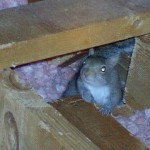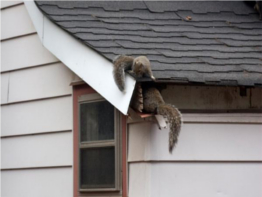How Can Squirrels Damage Your Attic

Squirrels frequently bring a smile to people’s faces when seen in parks darting about with their bushy tails. Unfortunately, they are far less charming in a home environment. Once they’ve made a nest in your attic, you have a number of issues to contend with besides the noise pollution of having fleet-footed animals tearing through your property.
1) There is a potential for rabies, parasites, and other diseases. Living in close quarters with wild animals means getting exposed to an increased variety of diseases. Squirrel feces and urine both contain bacteria and have the potential to weaken the wood in your attic through moisture rot and decomposition in addition to simply smelling terrible.
2) Along with possible transmitted diseases, squirrels can chew through the asbestos insulation in your home, damaging both your wall structure and insulation as well as releasing airborne asbestos particles into your home.
3) Structural damage from squirrels gnawing through your attic can be significant, particularly in areas with heavy rainfall or snowfall where the roof must withstand certain amounts of pressure. Additionally, leaky roofs and walls can lead to water damage and rot, increasing both risk of structural failure as well as mold growth. Wood is expensive, and fixing the damage caused by even a small family of squirrels can be cost-prohibitive if left unchecked.
4) Your electrical wiring may be in jeopardy. Squirrels can chew through wiring that is unprotected by modern metal casings, which can at best cause power inconveniences and at worst a disastrous house fire. While modern code requires protective casings for your wiring systems, a squirrel-caused fire is likely not the best time to learn that your home is not up to code.
If you find a squirrel in your neighborhood, remember how squirrels can damage your attic and make your home is protected.




